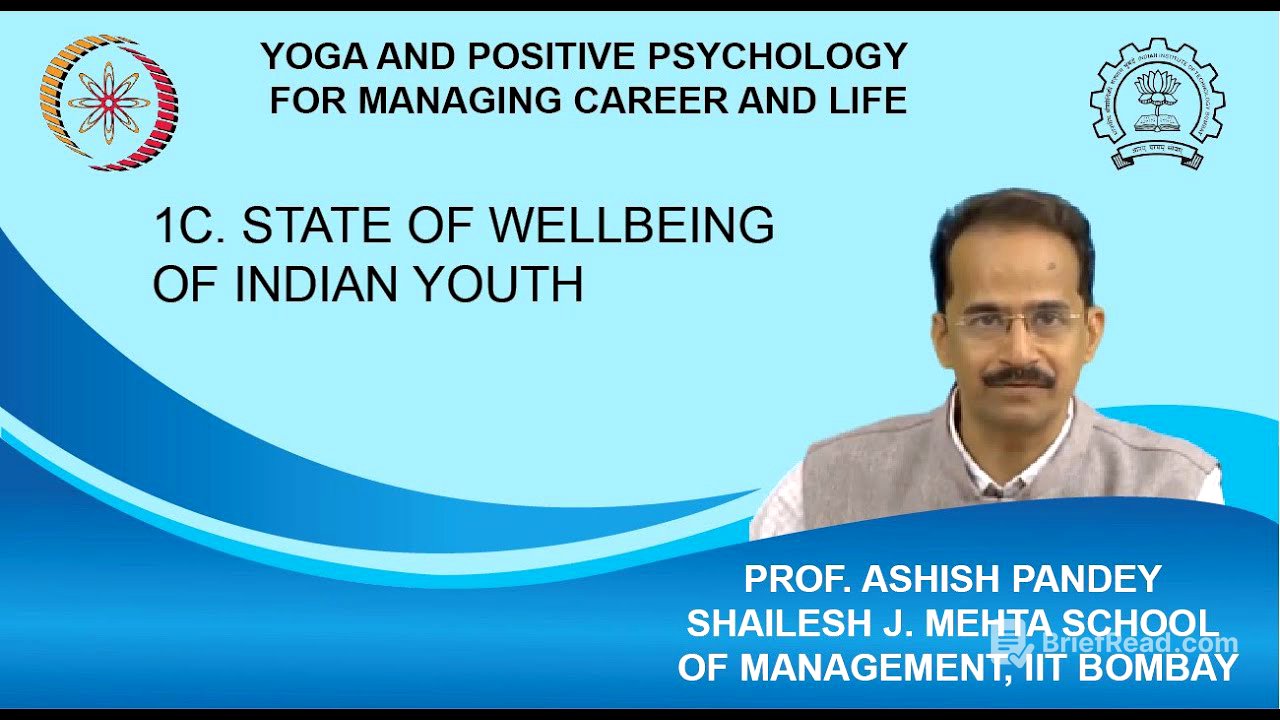TLDR;
The video explores the well-being of young workers and students, highlighting the increasing stress levels and mental health issues prevalent among millennials and Gen Z. It presents findings from a survey conducted in India, revealing that a significant portion of the youth population is either moderately flourishing or at risk of languishing. The study identifies self-direction and social connectedness as key determinants of flourishing, while family cohesion plays a role in preventing individuals from slipping into languishing. The insights from this research reinforce the importance of self-management and well-being in achieving personal fulfilment, echoing the ancient wisdom of the Bhagavad Gita.
- Stress and mental health issues are rising among young employees and students.
- A survey in India reveals that many young people are either moderately flourishing or at risk of languishing.
- Self-direction and social connectedness are crucial for flourishing.
Introduction: The State of Well-being Among Young People [0:17]
The presenter addresses the well-being of young workers, noting a discrepancy between the expectation of thriving employees and the reality of increasing stress and mental health issues. Data from surveys, including the Deloitte Millennial Survey, indicates that millennials and Gen Z (20-30 year olds) are experiencing significant stress related to financial uncertainty, family welfare, job prospects, and physical and mental health. This distress impacts their ability to be creative, innovative, and take advantage of opportunities in the changing professional landscape, potentially turning these opportunities into burdens.
The Seriousness of Mental Health Issues [2:53]
Mental health issues are gaining attention and becoming more serious, with suicide rates surpassing deaths from accidents, wars, and terrorist attacks combined. This suggests a widespread inability to find meaning and purpose in life, leading to emotional and mental dysfunction. Consequently, many individuals are languishing rather than thriving.
Indian Youth Well-being Survey [4:00]
A survey was conducted across India in 2021 to assess the well-being of Indian youth in higher education. Data was collected from various regions and streams of study, including engineering, law, and commerce. The findings revealed that over 51% of Indian youth are moderately flourishing, with 15% at risk of languishing, and only 35% are flourishing. Flourishing is defined as being filled with positive emotions and functioning well psychologically and socially, while languishing involves low well-being and a sense of emptiness and stagnation.
Factors Determining Flourishing and Languishing [6:41]
The study aimed to identify the factors that determine whether young people are flourishing, languishing, or moderately flourishing. Values, family cohesion, social connectedness, academic excellence, and engaged living were examined. Self-direction emerged as the major determinant of flourishing, with achievement showing an inverse relationship (higher achievement values sometimes leading to languishing). Social connectedness, or the ability to connect with and contribute to social causes, was another significant factor associated with flourishing. Family cohesion was found to be more closely related to preventing individuals from slipping into languishing.
Implications for Self-Management and Well-being [10:08]
The study reinforces the idea that flourishing is determined by self-direction, making self-management courses essential for attaining personal well-being. Self-management and career management are intricately connected to well-being, which is expressed through flourishing and the lack thereof through languishing. These are linked to agency, the ability to assess one's situation and take action. Therefore, self-management courses should focus on well-being, strengthen self-efficacy, and promote awareness of life situations and choices.
The Wisdom of the Bhagavad Gita [11:34]
The findings align with the ancient wisdom of the Bhagavad Gita, which states that "I am my foe and I am my friend." This highlights the importance of self-effort in self-management and self-improvement. The self is both the friend and foe, and individuals must use their own power to elevate themselves. This timeless message is supported by recent research on well-being in the youth population.









